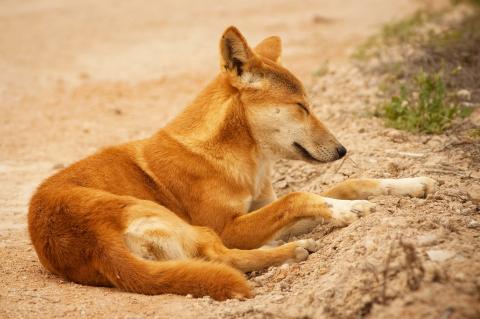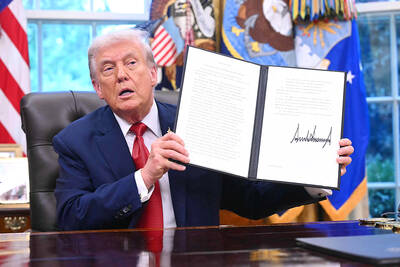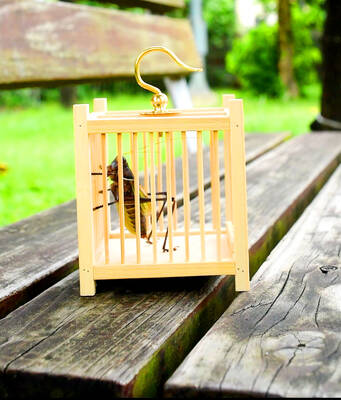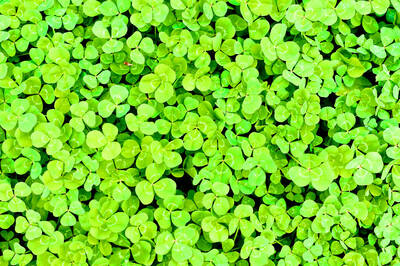Australian scientists are working to artificially produce the urine of wild dogs, hoping to keep other wild dogs away from humans and prevent them from destroying livestock, avoiding losses that mount into millions of dollars every year.
Researchers say the chemical message in the urine of dingoes, as the wild dogs are known, insists “this is my territory, stay out” — creating a “bio boundary” that the dogs and other wild animals cannot cross.
“We hope it would be a non-lethal tool for the management of dingoes in Australia,” said Alan Robley, senior research scientist at the Department of Sustainability and Environment, a government-funded research institute.

Photo courtesy of Henry Whitehead
照片由亨利‧懷特黑德提供
“You can use this non-lethal barrier to keep animals out of where people don’t want them — in their back yards or those sort of urban areas where towns are encroaching into the bush [wilderness], or on a farm where there are sheep and where dogs are coming in and attacking their sheep.”
Animals use chemical messages all the time to advertise their social status, whether or not they are sexually available and ready for reproduction, and things about their food. The messages come through the chemicals they excrete.
Scientists collect urine from captive dingoes — male and female, adults and juveniles — held in private collections around Australia. The urine is then sent to a laboratory where they can extract the molecular signature of the different chemicals that make up the urine.
“That analysis tells us how strong each of those chemicals are,” Robley said.
The chemicals are reproduced and presented back to the animals under test conditions to see how they respond.
It is believed that wild dogs cause roughly A$64 million (about NT$1.94 billion) in damage to livestock throughout Australia each year, A$18 million (about NT$545 million) in southern Victoria state alone.
“There’s a bit of work being done in Botswana on African wild dogs which is very similar to this, but no one’s tried to extract and identify the constituent chemical compounds of wild dogs or dingo urine before and use that in a management sense,” Robley said.
(Reuters)
澳洲科學家正試圖以人工方式,製造野狗尿液,希望藉此驅趕其他野狗靠近人類、防止牠們侵害家畜,並且避免每年高達上百萬元的損失。
研究員表示,澳洲犬尿液裡的化學信號,堅稱「這是我的地盤,勿近」─產生一個「生物界線」,使狗兒們與其他野生動物互不相犯。澳洲犬是當地野狗的統稱。
生態永續環保部門的資深研究科學家雅倫‧羅布里表示:「我們希望這是控管澳洲犬的一個非致命手段。」該部門是政府贊助的研究機構。
他說:「你可以利用這種非致命的界線,將動物從人們所不希望牠們進入的地方驅離,例如是他們的後院,或是那些侵佔荒野地區的城鎮,或是一座遭狗兒入侵攻擊羊隻的綿羊農場。」
動物無時無刻以化學信號宣示其社會地位、透露牠們是否正值發情期或準備繁衍後代,以及彰顯關於牠們食物的事宜。該信號來自牠們排泄出的化學物質。
科學家們蒐集不分公母老幼、被圈養的澳洲犬尿液,並將尿液存放在澳洲各地的私人蒐藏點,然後再將這些樣本送至附近實驗室,提取尿液中不同化學記號。
羅布里說:「那個分析告訴我們每種化學物質是多麼地強烈。」
這些化學物質被複製並送回給受試狀態下的動物,以觀察牠們的反應。
一般認為野狗對於整個澳洲家畜,每年所造成的損失大約是六千四百萬澳幣(約新台幣十九點四億元)。光是澳洲南部的維多利亞州,損失就高達一千八百萬澳幣(約新台幣五點四五億元)。
羅布里說:「非洲波紮那有對野狗,進行極類似的實驗,但之前從未有人試圖提取野狗或稱澳洲犬的尿液,並識別其組成化學化合物,或是從控管的觀點利用該化合物。」
(路透/翻譯:林亞蒂)

The content recommendation algorithm that powers the online short video platform TikTok has once again come under the spotlight after the app’s Chinese owner ByteDance signed binding agreements to form a joint venture that will hand control of operations of TikTok’s US app to American and global investors, including cloud computing company Oracle. Here is what we know so far about its fate, following the establishment of the joint venture. IS BYTEDANCE CEDING CONTROL? While the creation of this new entity marks a big step toward avoiding a US ban, as well as easing trade and tech-related tensions between Washington and Beijing, there

The world is teeming with danger and unpredictability. To safeguard themselves from harm and invite good fortune, people across cultures carry or display symbolic charms and trinkets. It is common to see beckoning cat figurines in stores in Japan, while people in China have historically kept crickets in cages for good luck. Even flora can serve as emblems of luck, with the four-leaf clover standing out as perhaps the most iconic. A clover is a small plant that typically grows 10 to 30 cms in height. While there are many species of clover, the variety that people consider to

Prompted by military threats from Russia, Denmark has recently passed a new conscription law, officially including women in its military draft for the first time. From July 1, 2025, Danish women, upon turning 18, will be entered into the draft lottery. If selected, they are to serve in the military for 11 months, just as men do. Not only has this decision attracted international attention, but it has also sparked discussions on gender, equality and national defense. Although Denmark’s reform appears to promote gender equality, it primarily responds to regional instability and the need to strengthen national defense. With

Continued from yesterday(延續自昨日) https://www.taipeitimes.com/News/lang Many people attribute the four-leaf clover’s reputation for luck not merely to its rarity but also to the myths and legends that surround it. Here are two such tales that help shed light on how the four-leaf clover came to be seen as a lucky charm. The first story originates from the Biblical narrative of Adam and Eve. According to Christian tradition, Adam and Eve, the first humans created by God, resided in the idyllic Garden of Eden. After they were expelled for defying God’s command, Eve is said to have plucked a four-leaf clover as a